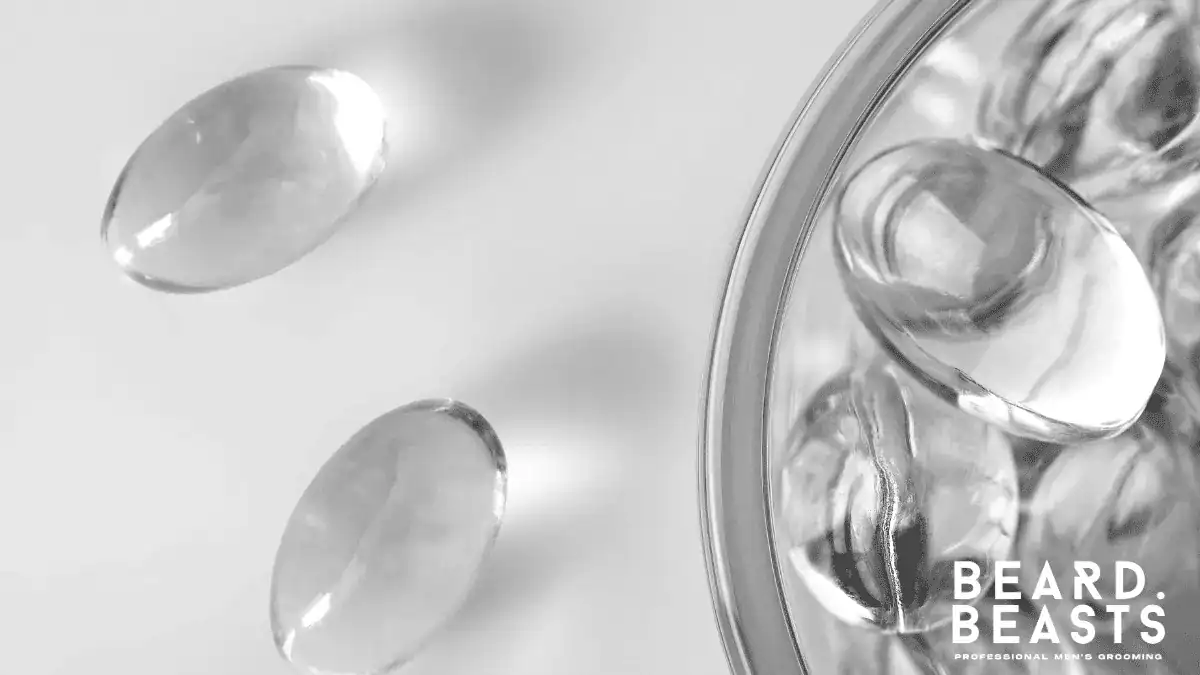Dealing with a frizzy beard can be frustrating, but with the right techniques, you can keep beard frizz under control and enjoy a smooth, stylish look.
In this comprehensive guide, we’ll explore everything you need to know about taming your beard, from understanding the causes of frizz to mastering advanced grooming tips. You’ll learn how proper washing, conditioning, and the right tools can transform your beard, alongside insights into the lifestyle changes that promote healthy hair growth.
Whether you’re a beard newbie or a seasoned grower, these tips will help you maintain a healthy, frizz-free beard that looks and feels great.
Understanding Beard Frizz
Frizzy beard driving you nuts? You’re not alone! Let’s dive into the common culprits behind beard frizz and understand how beard hair differs from the hair on your head.

Common Causes of a Frizzy Beard
1. Dryness
- Lack of Moisture: Just like your skin, your beard needs hydration. When it’s dry, it can become brittle and frizzy.
- Environmental Factors: Cold weather and indoor heating can strip moisture from your beard, leading to dryness.
2. Humidity
- Weather Woes: Humid weather can cause beard hair to swell and frizz.
- Sweat: If you’re in a humid climate or sweat a lot, the excess moisture can lead to unruly beard frizz.
3. Poor Grooming Habits
- Skipping Conditioner: Not using a beard conditioner or oil can leave your beard dry and frizzy.
- Rough Handling: Over-brushing or using a coarse comb can damage the hair, making it frizzy.
Beard Hair vs. Scalp Hair
1. Texture Differences
- Coarser Hair: Beard hair is generally thicker and more coarse than the hair on your head. This makes it more prone to frizz.
- Curly Nature: Beard hair tends to be curlier, which can contribute to frizz if not properly managed.
2. Care Needs
- Specialized Products: Beard hair benefits from specific products like beard oil and balm, which are designed to hydrate and smooth.
- Gentle Grooming: Using the right tools, like a wide-tooth beard comb or a boar-bristle beard brush, is crucial for taming frizzy beard hair.
Key Takeaways
- Stay Hydrated: Keep your beard moisturized with oils and conditioners.
- Mind the Weather: Adjust your beard care routine according to the climate.
- Groom Smart: Use gentle grooming techniques and the right products to keep your beard looking its best.
By understanding the causes of beard frizz and how to properly care for your unique beard hair, you can maintain a smooth, stylish look with ease. Say goodbye to the frizzy beard blues and hello to a well-tamed mane!
Daily Beard Care Routine
Let’s streamline your daily beard care routine to ensure your beard stays clean, hydrated, and frizz-free without redundancy. Here’s how to maintain a healthy beard every day:
Washing
Best Practices for Washing Your Beard
- Lukewarm Water: Use lukewarm water to wash your beard, avoiding hot water which can strip natural oils and cause dryness.
- Beard Shampoo: Opt for a gentle, beard-specific shampoo. Work it into your beard thoroughly, reaching the skin underneath.
- Rinse Thoroughly: Ensure all shampoo is rinsed out to prevent residue buildup.
- Frequency: Wash your beard 2-3 times a week to maintain cleanliness without drying it out.
Conditioning
How Often to Use Beard Conditioner and Oils
- Beard Conditioner: Apply conditioner after every wash to restore moisture and softness.
- Daily Oils: Use beard oil daily to lock in moisture, especially after washing, to keep your beard hydrated and frizz-free.
- Beard Balm or Butter: For added moisture and control, use a beard balm or butter. This is especially helpful for longer beards or those prone to frizz.
Combing and Brushing
Techniques for Detangling and Styling
- Combing:
- Wide-Tooth Comb: Start with a wide-tooth beard comb to gently detangle. Work from the tips upwards to avoid pulling and breakage.
- Direction: Always comb in the direction of hair growth to minimize frizz.
- Brushing:
- Boar Bristle Brush: Use a boar bristle beard brush to evenly distribute oils and smooth your beard. This helps condition the hair and reduce frizz.
- Daily Routine: Brush your beard daily to keep it neat, remove tangles, and stimulate the skin underneath.
- Styling:
- Shape and Hold: After applying beard oil or balm, style your beard using your comb and brush.
- Heat Styling: For persistent frizz, use a beard straightener or blow dryer on a low heat setting. Always apply a heat protectant before using heat tools.
Key Takeaways
- Wash Wisely: Use lukewarm water and beard shampoo 2-3 times a week to maintain cleanliness.
- Condition Daily: Apply conditioner post-wash and beard oils daily to ensure hydration.
- Groom Gently: Use a wide-tooth comb and boar bristle brush for detangling and styling to reduce frizz.
By incorporating these steps into your daily routine, you can maintain a healthy, frizz-free beard that looks and feels great. Stick to these practices, and you’ll have a well-maintained beard ready for any occasion.
Ready for more advanced grooming tips? Let’s dive in!
Advanced Grooming Tips
Ready to take your beard care to the next level? These advanced grooming tips will help you maintain the perfect shape and keep that frizzy beard in check. Let’s dive in!
Trimming
How to Trim Your Beard to Maintain Shape and Reduce Frizz
- Invest in Quality Tools: Use sharp scissors and a reliable beard trimmer with multiple guard lengths.
- Trim Regularly: Regular trims help prevent split ends and reduce frizz. Aim to trim every 1-2 weeks.
- Shape It Up: Define the shape of your beard. Start by outlining your cheek lines, necklines, and mustache.
- Comb First: Always comb your beard before trimming to ensure all hairs are straight and you can see the true length.
- Gradual Trim: Trim small amounts at a time. It’s easier to trim more if needed than to fix an over-trimmed beard.
- Blend the Edges: Use a longer guard to blend the edges and avoid a sharp contrast between different parts of your beard.
Heat Treatments
Using a Beard Straightener or Blow Dryer Safely
- Heat Protectant: Always apply a heat protectant spray to your beard before using any heat tools. This helps prevent damage and frizz.
- Blow Dryer Tips:
- Low Heat Setting: Use the blow dryer on a low heat setting to avoid overheating your beard.
- Directional Drying: Dry in the direction of hair growth to minimize frizz. Use a round brush to help straighten and shape your beard.
- Beard Straightener:
- Temperature Control: Choose a beard straightener with adjustable temperature settings. Start with the lowest setting and increase as needed.
- Straighten in Sections: Work in small sections, slowly passing the straightener through your beard to ensure even heat distribution.
Beard Masks and Treatments
DIY and Commercial Products for Deep Conditioning
- DIY Beard Masks:
- Avocado and Honey Mask: Mix mashed avocado with honey and apply it to your beard. Leave for 20 minutes before rinsing. This mask provides deep hydration.
- Coconut Oil and Aloe Vera: Combine equal parts coconut oil and aloe vera gel. Apply to your beard and leave for 30 minutes before washing out. This treatment helps reduce frizz and soften your beard.
- Commercial Products:
- Deep Conditioning Masks: Look for masks specifically designed for beards. These are formulated to penetrate thicker beard hair and provide intense hydration.
- Leave-In Conditioners: Use a leave-in conditioner to keep your beard moisturized throughout the day. These products help maintain softness and manage frizz.
Key Takeaways
- Trim Smart: Regular trims with quality tools help maintain shape and reduce beard frizz.
- Use Heat Wisely: Protect your beard from heat damage with the right products and settings.
- Deep Condition: Incorporate DIY or commercial beard masks and treatments for intense hydration and frizz control.
By incorporating these advanced grooming tips into your routine, you’ll keep your beard looking sharp, healthy, and frizz-free. Embrace these techniques, and enjoy a well-groomed beard that’s ready to impress!
Ready to explore the impact of lifestyle factors on your beard? Let’s continue!
Lifestyle Factors
Your daily habits and lifestyle choices can significantly impact the health and appearance of your beard. Let’s explore how diet, hydration, stress, and sleep play crucial roles in managing a frizzy beard and overall beard health.
Diet and Hydration
The Role of Nutrition and Water Intake in Beard Health
- Balanced Diet: Eating a balanced diet rich in vitamins and minerals supports healthy hair growth. Focus on:
- Protein: Hair is made of keratin, a protein. Include lean meats, eggs, and legumes in your diet.
- Vitamins: Vitamins A, C, and E promote hair health. Find them in leafy greens, citrus fruits, and nuts.
- Omega-3 Fatty Acids: Found in fish, flaxseeds, and walnuts, these help keep your beard hair hydrated and shiny.
- Hydration: Drinking plenty of water keeps your skin and hair hydrated, reducing the risk of beard frizz.
- Daily Intake: Aim for at least 8 glasses of water a day to maintain optimal hydration levels.
- Hydrating Foods: Include water-rich foods like cucumbers, oranges, and strawberries in your diet.
Stress Management
How Stress Affects Your Hair and Tips to Manage It
- Impact of Stress: High stress levels can lead to hair loss and negatively affect the growth and health of your beard. Stress can also exacerbate beard frizz.
- Cortisol Levels: Stress increases cortisol levels, which can disrupt hair growth cycles.
- Inflammation: Chronic stress can lead to inflammation, affecting hair follicles.
- Stress-Relief Techniques:
- Exercise: Regular physical activity reduces stress and promotes healthy circulation, which benefits hair growth.
- Mindfulness and Meditation: Practices like meditation, deep breathing, and yoga can help manage stress levels.
- Hobbies: Engage in activities you enjoy to help reduce stress and improve overall well-being.
Sleep
The Importance of Adequate Sleep for Overall Hair Health
- Hair Growth and Repair: During sleep, your body repairs and regenerates cells, including those responsible for hair growth.
- Growth Hormones: Adequate sleep promotes the release of growth hormones that aid in hair growth.
- Cell Turnover: Proper rest enhances cell turnover, which is vital for maintaining a healthy beard.
- Sleep Tips:
- Consistent Schedule: Maintain a regular sleep schedule to ensure you get 7-9 hours of sleep per night.
- Sleep Environment: Create a comfortable sleep environment. Keep your bedroom cool, dark, and quiet.
- Relaxation Routine: Develop a pre-sleep routine to wind down. Avoid screens and try reading or listening to calming music before bed.
Key Takeaways
- Eat Well: A balanced diet rich in protein, vitamins, and omega-3s supports healthy beard growth and reduces frizz.
- Stay Hydrated: Drink plenty of water and eat hydrating foods to keep your beard and skin moisturized.
- Manage Stress: Reduce stress through exercise, mindfulness, and hobbies to prevent hair loss and frizz.
- Sleep Adequately: Ensure 7-9 hours of quality sleep to promote hair growth and repair.
By paying attention to these lifestyle factors, you can significantly enhance the health and appearance of your beard. Incorporate these habits into your daily routine for a fuller, healthier, and frizz-free beard.
Ready to discover the best products for your beard care? Let’s continue!
Common Mistakes to Avoid
Even with the best intentions, certain mistakes in beard care can lead to a frizzy beard and other issues. Let’s look at some common pitfalls and how to avoid them to keep your beard looking its best.
Over-Washing
Dangers of Washing Too Frequently
- Strips Natural Oils: Washing your beard too often removes the natural oils that keep it moisturized and healthy. This can lead to dryness and beard frizz.
- Dryness and Irritation: Over-washing can dry out both your beard hair and the skin underneath, causing itchiness and flakiness.
- Recommendation: Stick to washing your beard 2-3 times a week. On non-wash days, rinse your beard with water and use conditioner to keep it clean and hydrated.
Wrong Products
How to Avoid Products That Can Cause Dryness or Damage
- Harsh Ingredients: Many commercial shampoos and soaps contain sulfates and alcohols that can dry out your beard and skin.
- Sulfates: These can strip your beard of its natural oils, leading to dryness and frizz.
- Alcohol: Found in some styling products, alcohol can dehydrate your beard hair.
- Synthetic Fragrances: These can cause irritation and dryness. Opt for products with natural scents derived from essential oils.
- Recommendation: Choose products specifically formulated for beards. Look for natural ingredients like jojoba oil, argan oil, and shea butter which nourish and hydrate your beard.
Improper Technique
Mistakes in Combing, Brushing, or Trimming
- Combing:
- Wrong Tools: Using a plastic comb can create static and frizz. Instead, use a wooden or metal wide-tooth comb.
- Aggressive Detangling: Yanking through knots can break hair and cause frizz. Always start from the tips and work your way up gently.
- Brushing:
- Over-Brushing: Brushing too frequently can damage hair cuticles and lead to frizz. Limit brushing to once or twice a day.
- Wrong Brush: Use a boar bristle brush to distribute oils evenly and reduce frizz. Avoid using brushes with synthetic bristles.
- Trimming:
- Inconsistent Trimming: Irregular trims can lead to split ends and an unkempt appearance, contributing to frizz.
- Dull Tools: Using dull scissors or trimmers can cause hair to split and fray. Ensure your tools are sharp and well-maintained.
- Recommendation: Trim your beard regularly, every 1-2 weeks, to maintain shape and health. Always use sharp, quality tools for a clean cut.
Key Takeaways
- Wash Wisely: Limit washing to 2-3 times a week to avoid stripping natural oils and causing dryness.
- Choose Right Products: Avoid harsh ingredients and opt for natural, beard-specific products to maintain hydration and reduce frizz.
- Groom Gently: Use the right tools and techniques for combing, brushing, and trimming to prevent damage and keep your beard looking great.
By avoiding these common mistakes, you can ensure your beard stays healthy, hydrated, and free from frizz.
Frequently Asked Questions (FAQs)
Got questions about managing a frizzy beard? We’ve got you covered! Here are some common questions and their answers to help you keep your beard looking its best.
Why Does My Beard Grow Frizzy?
- Dryness: One of the main reasons for a frizzy beard is dryness. Lack of natural oils can make beard hair brittle and prone to frizz.
- Humidity: High humidity levels can cause beard hair to swell and frizz.
- Improper Care: Using harsh products or skipping regular grooming can lead to frizz.
- Hair Texture: Beard hair is naturally coarser and curlier than scalp hair, making it more susceptible to frizz.
Does Beard Oil Stop Frizz?
- Hydration: Beard oil is excellent for hydrating your beard, which helps reduce dryness and frizz.
- Nourishment: Oils like jojoba, argan, and coconut oil provide essential nutrients that strengthen beard hair and prevent frizz.
- Smoothness: Regular use of beard oil helps smooth out beard hair, making it more manageable and less frizzy.
- Application: Apply a few drops of beard oil daily, especially after washing your beard, to keep it soft and frizz-free.
How Do You Straighten a Fuzzy Beard?
- Use a Beard Straightener: A beard straightener can help tame a fuzzy beard. Start with a low heat setting and gradually increase as needed.
- Blow Drying: Use a blow dryer with a low heat setting and a round brush. Dry your beard in the direction of hair growth to minimize frizz.
- Heat Protectant: Always apply a heat protectant spray before using any heat tools to prevent damage.
- Beard Balm: Apply beard balm or butter after straightening to lock in moisture and keep your beard in place.
How to Stop a Beard from Going Fuzzy?
- Regular Trims: Trim your beard regularly to prevent split ends and maintain its shape.
- Proper Washing: Wash your beard 2-3 times a week with a gentle beard shampoo to keep it clean without stripping natural oils.
- Conditioning: Use a beard conditioner after washing and apply beard oil daily to keep your beard hydrated.
- Right Tools: Use a wide-tooth comb and a boar bristle brush to detangle and smooth your beard.
- Healthy Lifestyle: Maintain a balanced diet, stay hydrated, manage stress, and get enough sleep to promote healthy hair growth and reduce frizz.
Key Takeaways
- Hydrate and Nourish: Use beard oil daily to keep your beard moisturized and frizz-free.
- Straighten Safely: Use heat tools on a low setting with a heat protectant to straighten your beard without causing damage.
- Consistent Care: Regular trims, proper washing, and conditioning are essential to prevent your beard from going fuzzy.
By understanding the causes of beard frizz and following these tips, you can keep your beard looking smooth, healthy, and well-groomed. Have more questions? Feel free to reach out or explore our other beard care articles!
Conclusion
Taming a frizzy beard might seem challenging, but with the right care and routine, you can achieve a smooth, healthy, and well-groomed beard. Let’s recap the essential steps and tips to keep your beard frizz-free.
Key Points to Remember
- Understanding Beard Frizz: Knowing the causes of beard frizz, such as dryness and humidity, helps you tackle the problem at its root.
- Daily Beard Care Routine:
- Washing: Use lukewarm water and beard-specific shampoo 2-3 times a week.
- Conditioning: Apply beard conditioner and oils daily to maintain moisture.
- Combing and Brushing: Use a wide-tooth comb and boar bristle brush for gentle detangling and styling.
- Advanced Grooming Tips:
- Trimming: Regular trims keep your beard in shape and reduce frizz.
- Heat Treatments: Use a beard straightener or blow dryer safely with a heat protectant.
- Beard Masks and Treatments: Deep conditioning treatments, both DIY and commercial, provide extra hydration.
- Lifestyle Factors: A balanced diet, proper hydration, stress management, and adequate sleep all contribute to a healthy beard.
- Avoid Common Mistakes: Don’t over-wash, use harsh products, or groom improperly.
Final Thoughts
A well-maintained beard not only enhances your appearance but also boosts your confidence. By understanding the causes of beard frizz and implementing these tips into your daily routine, you can enjoy a soft, manageable, and frizz-free beard.
Remember, consistency is key. Stick to your grooming routine, use the right products, and make healthy lifestyle choices. Your beard will thank you!





